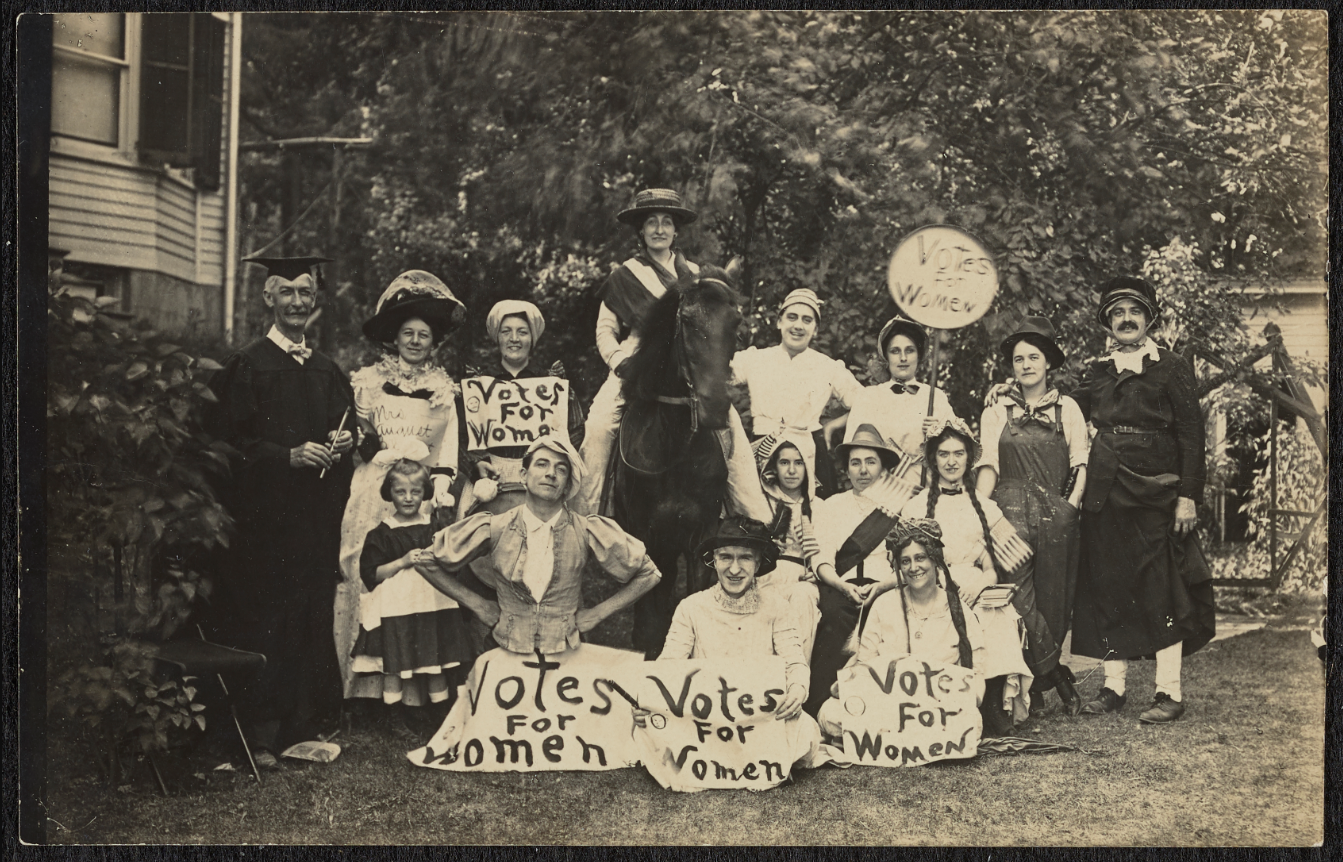In the John Hopkins University’s historical collection is a postcard, ca. 1910, of an anti-suffragist group consisting of women dressed supposedly unfashionably in large overalls, and men dressed in what the archivists call “suffrage drag”. Aside from the leering expressions on their faces, I’m delighted by what this image conjures. I see anti-suffragists sitting down and lettering “VOTES FOR WOMEN” onto posters; men squeezing themselves into puffy blouses and frilly skirts, feeling, even though they were determinedly unempathetic, the swaths and layers of fabric that were one manifestation of the burdens that weighed women down. Squint, and the mimicry flakes away, leaving behind all the motions of Suffragette communion.
Melanie Joosten’s forthcoming novel, Like Fire-Hearted Suns, reimagines the Suffragette movement of England from the perspectives of young suffragettes, and the women who worked in Holloway, the prison where convicted suffragettes were sent. History classes cover the macroscopic: grand parades, militant protests, mass arrests, hunger strikes, and force-feeding; but in the act of novelisation, Joosten closely examines the personal and interpersonal. Beatrice, one of the protagonists, tries to resist this novelisation, embodying the revolutionary who lives, eats, and breathes in political ideals: a figure that belongs not in a novel, but in a history textbook.
A college student who becomes embroiled in the infamously militant Women’s Social and Political Union (WSPU), Beatrice tries to shed any parts of her identity that are superfluous to her purpose. When made to introduce herself to her fellow suffragettes in prison, she thinks, “What do names matter?…need we be tied to them any longer? Are we not of a piece, part of a great machine bearing down on those complacent?”
Her insistent rejection of names — of individuality at large — speaks to an urge to aggrandise, to collectivise, to abstract, to reduce. Her identification with being and occupying a part of a machine reflects her impatience with semantics altogether. Machines have no need for words, only actions to be learned and repeated. Befittingly, “deeds not words” becomes Beatrice’s machine-like credo.
In verbalising Beatrice’s character, the novel argues against her. The very language that Beatrice uses is contradictory (being “part of a…machine”, no matter how great or revolutionary, is to be complacent). Despite her apparent contempt for words, Beatrice is affected by the discrepancy in her mother’s language when talking about her versus when talking about her brother — “I suppose it’s impossible for a boy to be spoiled…the way my mother talks, anyone would think I’m minutes away from turning, like a cut of meat left in the sun.” Yet these are contradictions that Joosten leaves the reader to identify. Beatrice herself is stalwart in her mindset, impatient with pamphlets, articles, names, and words, gravitating instead to rampant militancy to propel the cause forward. In turning away from semantics, however, she loses the definition of ‘the cause’ altogether.
Since Joosten and we, the readers, retain the advantage of hindsight from a 21st Century perspective, we are able to draw upon the anatomy of écriture féminine. It reminded me of reading the works of Susan Sontag and Annie Ernaux who obliterate the false barrier between language and the condition of the female body, and therefore, between the personal and the collective.
Ernaux, a French feminist memoirist at the turn of the millennium, wrote that her goal is “for my body, my sensations, and my thoughts to become writing…something intelligible and universal, causing my existence to merge into the lives and heads of other people.” Joosten’s narrativising of Beatrice’s experiences does the same.
On the day that the WSPU parade tries to push through the gates to the Houses of Parliament, Beatrice is within the group of women who are sectioned off, jostled, and physically assaulted by counter-protesters. The language describing this experience is disembodying: Beatrice is split into objectified parts of her body, like cuts of meat — she becomes “arms and legs, torso, head”, “rough thumbs down her cheek”, and “spasms shooting through her shoulders.” This visceral, violent assault on Beatrice’s body merges her experience with the experiences of women everywhere, of every age. This image reverberates today in the upsettingly high number of domestic violence cases, in the media through the objectifying male gaze, and in the newest technological ‘advancement’ where images of women’s faces and bodies are stolen and pornographised with artificial intelligence.
Like the postcard, Like Fire-Hearted Suns is teeming with anti-suffragists: the reactionary, the incendiary, the wilfully ignorant, the tomato-throwers, the ones inclined to fetishise. Joosten also forces readers to don “suffrage drag”, by distilling the bodies, sensations, and thoughts of suffragettes into words—not for the purpose of mockery, but rather to elicit a violent empathy, and a sense that ‘the cause’ is not over, not yet, not until a board of women vote on abortion laws, and women alone govern their own bodies.





